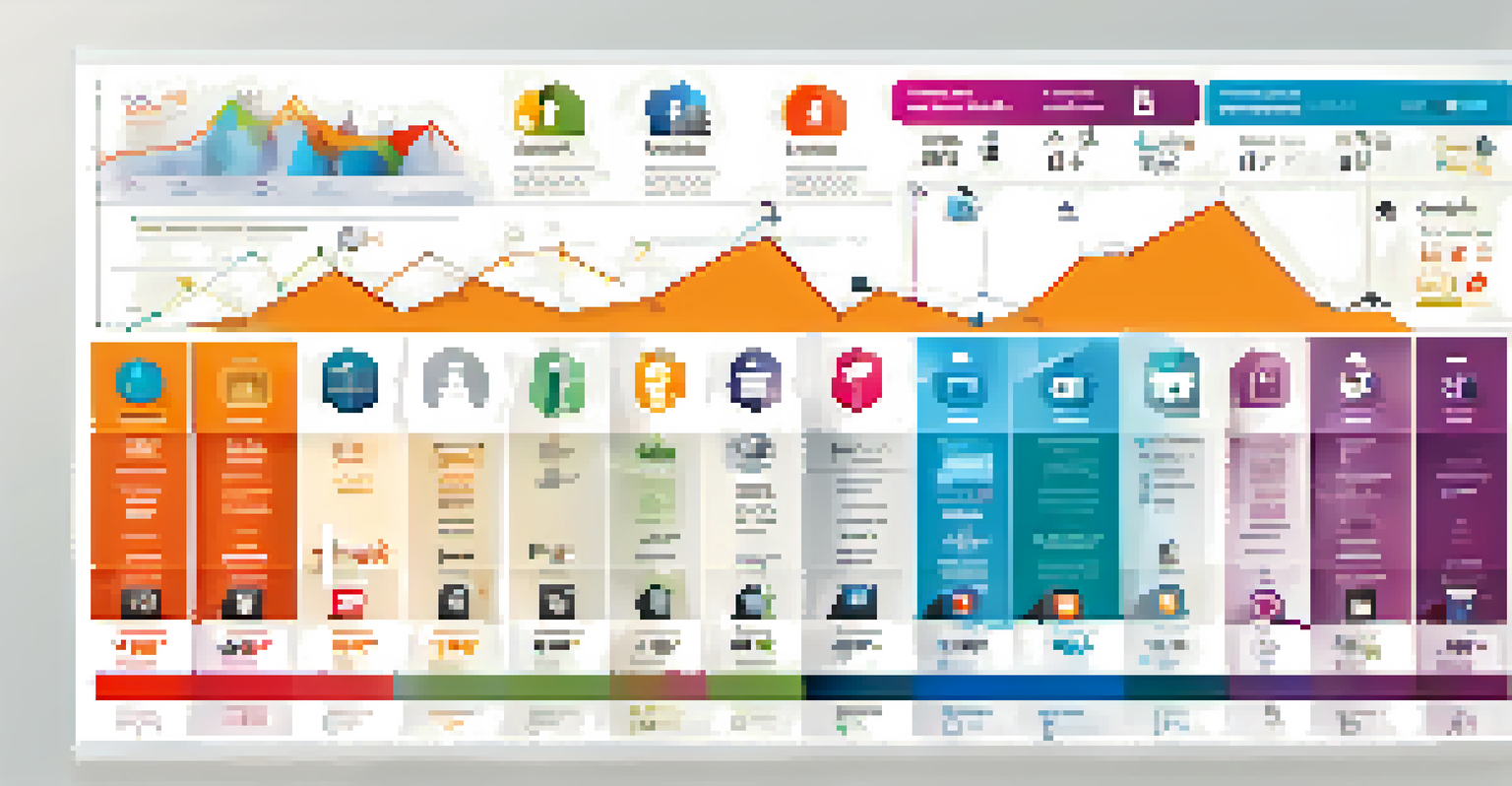Utilizing Social Media Analytics to Drive Business Growth

Understanding Social Media Analytics and Its Importance
Social media analytics refers to the process of gathering data from social media platforms to gain insights into customer behavior and preferences. This data can help businesses make informed decisions about their marketing strategies. By understanding what works and what doesn’t, companies can optimize their content and engagement efforts.
Without data, you're just another person with an opinion.
In a world where social media influences consumer choices, leveraging analytics is no longer optional; it’s essential. Companies that utilize these insights can tailor their messaging to resonate more deeply with their audience. This leads to improved engagement rates and a stronger brand presence online.
Furthermore, social media analytics allows for real-time feedback, enabling businesses to adapt quickly to changing trends or consumer sentiments. For example, if a particular campaign isn't performing well, analytics can pinpoint the issue, allowing for swift adjustments to improve outcomes.
Identifying Key Performance Indicators (KPIs)
To effectively utilize social media analytics, businesses must first identify relevant Key Performance Indicators (KPIs). These are measurable values that demonstrate how effectively a company is achieving key business objectives. Common KPIs include engagement rates, follower growth, and conversion rates.

By focusing on the right KPIs, businesses can gain clearer insights into their social media performance. For instance, if a brand’s goal is to increase website traffic, tracking click-through rates from social posts would be essential. This focused approach helps in aligning social media efforts with broader business goals.
Importance of Social Media Analytics
Social media analytics is essential for businesses to understand customer behavior and optimize marketing strategies.
Additionally, setting specific targets for these KPIs allows for better assessment of success over time. Regularly reviewing these metrics can highlight trends and areas for improvement, leading to more effective strategies moving forward.
Utilizing Audience Insights for Tailored Content
One of the most valuable aspects of social media analytics is the ability to gather audience insights. This data reveals who your audience is, what they like, and when they’re most active online. Understanding these factors allows businesses to create targeted content that resonates with their audience.
Data beats emotions.
For example, if analytics show that a target demographic prefers video content during weekday evenings, companies can schedule their posts accordingly. This strategic timing can significantly enhance engagement and visibility. Tailoring content to audience preferences not only boosts interaction but also fosters a sense of community.
Moreover, audience insights can inform product development and marketing strategies. By listening to feedback and observing trends, businesses can innovate and adapt their offerings to better serve their customers' needs.
Competitor Analysis Through Social Media Metrics
Another powerful application of social media analytics is competitor analysis. By examining competitors' social media performance, businesses can identify strengths and weaknesses in their own strategy. Metrics such as engagement levels and follower growth can provide valuable benchmarks.
For example, if a competitor is gaining traction with a particular type of post, businesses can analyze what makes it successful. Are they using visuals more effectively? Is their messaging more engaging? Understanding these elements can inspire new ideas and strategies.
Utilizing Audience Insights Effectively
Gathering audience insights allows businesses to create tailored content that resonates with their target demographic.
Additionally, keeping an eye on competitors can reveal market trends and consumer preferences. This proactive approach enables businesses to stay ahead of the curve and adapt their strategies to maintain a competitive edge.
Engagement Metrics: The Heart of Social Media Success
Engagement metrics, such as likes, shares, and comments, are critical indicators of how well content resonates with an audience. High engagement rates often signify that your content is valuable and interesting to your followers. These metrics can guide content creation, helping businesses focus on what truly engages their audience.
For instance, if a particular post receives a lot of shares, it may be worth exploring similar themes or formats in future content. This iterative process of analyzing engagement can lead to more effective campaigns and stronger audience connections.
Moreover, engagement metrics can also provide insights into the timing and frequency of posts. Understanding when your audience is most active can optimize reach and interaction, ensuring that content is seen and appreciated by as many people as possible.
Leveraging Social Listening for Brand Improvement
Social listening involves monitoring online conversations about your brand, competitors, and industry trends. This practice goes beyond analytics, focusing on understanding consumer sentiment and feedback. By leveraging social listening, businesses can gain deeper insights into how they are perceived by their audience.
For example, if customers frequently mention a specific issue with a product, businesses can address it proactively. This not only improves customer satisfaction but also demonstrates that the brand values consumer feedback. Such responsiveness can significantly enhance brand loyalty.
Actionable Strategies from Data
Turning insights from social media analytics into actionable strategies is crucial for driving business growth and enhancing brand presence.
Additionally, social listening can reveal emerging trends and topics of interest within your industry. Staying attuned to these conversations allows businesses to remain relevant and engage in meaningful discussions with their audience.
Turning Insights into Actionable Strategies
The ultimate goal of social media analytics is to turn insights into actionable strategies. Once you've gathered and analyzed data, the next step is figuring out how to implement findings effectively. This could involve adjusting your content strategy, refining your target audience, or even rethinking your product offerings.
For instance, if analytics indicate that video content leads to higher engagement, businesses might consider increasing their video production efforts. Similarly, if certain demographics are more engaged than others, tailoring messages specifically to those groups can yield better results.

Ultimately, the ability to adapt based on analytics is what drives business growth. By continuously refining strategies in response to data, companies can create a more dynamic and effective presence on social media.